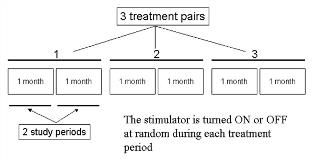RANDOMIZED CONTROLLED STUDIES OF CHRONIC HIPPOCAMPAL STIMULATION IN SINGLE PATIENTS WITH TEMPORAL LOBE EPILEPSY
Abstract number :
2.442
Submission category :
Year :
2003
Submission ID :
1781
Source :
www.aesnet.org
Presentation date :
12/6/2003 12:00:00 AM
Published date :
Dec 1, 2003, 06:00 AM
Authors :
Andrew Parrent, Samuel Wiebe, Suzan Matijevic, Laura Janzen, Susan Piggot, Cynthia Kubu, Richard McLachlan Clinical Neurological Sciences, London Health Sciences Centre, London, ON, Canada
Temporal lobectomy, the optimum therapy for patients with temporal lobe epilepsy (TLE), is contraindicated in patients whose seizures originate in both temporal lobes equally, those at risk for substantial decline in memory, and those who have failed a previous temporal lobectomy. Previous uncontrolled studies suggest that chronic hippocampal stimulation (CHS) may safely improve seizures. We explored the efficacy and safety of unilateral CHS in double-blind, randomized, controlled, cross-over studies involving single patients.
Four patients with unilateral, refractory TLE whose risk to memory contraindicated surgery, underwent unilateral CHS. Each patient received 3 pairs of 1-month on and 1-month off periods of CHS (total of 6 months). The sequence of CHS treatment (on or off) was randomly determined. [figure1]Patients, treating clinicians and outcome assessors were blinded to the CHS on/off status. We measured monthly seizure frequency, quality of life (QOL) using QOLIE-89 and impact of epilepsy, seizure severity, affect, neuropsychological function (attention, visual and verbal memory and retention, and object naming), patient-specific symptoms, and morbidity. Within-patient differences in outcomes between on and off monthly treatment periods were assessed using paired T tests and 95% confidence intervals. Results are presented for individual patients.
There was no significant difference in seizure frequency between the CHS on and CHS off treatment periods in any of the patients. However, one patient became and remained seizure free four months after starting the study, two patients[apos] seizures improved as compared to pre-CHS baseline seizure frequency (regardless of CHS being on or off), and one patient[apos]s seizures did not change. Neuropsychological function was not significantly different when CHS was on or off in any of the patients. One patient[apos]s QOL worsened when CHS was on, while seizure frequency remained unchanged. Patient-specific symptoms did not differ when CHS was on or off.
The direct comparison of monthly periods of CHS on or off yielded no significant differences in any of the patients. However, seizures improved over the six month trial in 3 of 4 patients as compared to baseline. This suggests that the benefit of HCS may occur over periods longer than one month. In order to assess this, randomized controlled trials should assess longer CHS treatment periods. Importantly, CHS did not adversely affect neuropsychological function or seizures. The long-term consequences of HCS are uncertain.
